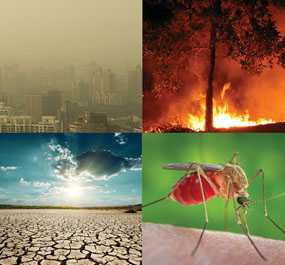Climate Change and Health – From Science to Practice (An Encore Presentation)
Tuesday, July 21, 2015, at 1pm EST.
Rebroadcast from December 16, 2014, at 1pm EST.
 Changes occurring in the world’s climate pose significant threats to human health and wellbeing and will have even greater impacts in the future. These threats are wide-ranging, including decreased air quality and increases in extreme weather events, wildfire, and illnesses transmitted by water, and disease-carriers, such as mosquitoes and ticks. Although scientific understanding of the effects of climate change is still emerging, there is considerable evidence to support preparing for potential health risks.
Changes occurring in the world’s climate pose significant threats to human health and wellbeing and will have even greater impacts in the future. These threats are wide-ranging, including decreased air quality and increases in extreme weather events, wildfire, and illnesses transmitted by water, and disease-carriers, such as mosquitoes and ticks. Although scientific understanding of the effects of climate change is still emerging, there is considerable evidence to support preparing for potential health risks.
Studies have shown that adverse climate events are increasing in both intensity and frequency, contributing to rising rates of illness as well as mortality. Elevated temperatures in the 2003 European heat wave resulted in over 30,000 confirmed heat-related deaths & 70,000 excess deaths from all causes. Flooding has caused billions of dollars of damage and significant loss of life. The populations most vulnerable—children, elderly people, those living in poverty, people living in certain geographic areas and people with underlying health conditions—are at even greater health risk from climate change.
Planning for climate change provides opportunities to protect human health and well-being across many sectors. Early public health action is essential to ensuring that systems are in place to protect people from the impacts of climate change. As the nation's public health agency, CDC is using its prevention expertise to help states and cities investigate, prepare for, and respond to the health effects of climate change.
This session of Grand Rounds will explore the wide-ranging health impact of our changing climate and discuss some of the strategies, programs and partnerships currently being used to confront the challenges associated with global climate change.
Presentation
Welcome to Climate Change and Health – From Science to Practice
United States Surgeon General, Dr. Vivek Murthy, welcomes you to the encore presentation of Climate Change and Health – From Science to Practice. Climate change poses a serious, immediate and global threat to human health and the responsibility for taking action to address this threat rests with every person, every community, every leader and every government around the world. Addressing climate change is a health issue and a moral issue and each of us has a responsibility to do what we can, as much as we can and for as long as we can.
December 2014
Beyond the Data Beyond brings you "take home" messages for you to use in your practice, in your classroom and in your home.
Dr. John Iskander and Dr. George Luber discuss some of the challenges associated with global climate change. The health impact of the changing climate is wide-ranging, including:
- Increased frequency and severity of chronic disease and infectious disease cases
- Negative impact on mental health and sense of well-being,
- Exposure to extreme weather and health concerns in areas that were previously unaffected.
Public health agencies must:
- Use their prevention expertise to assess the vulnerability of communities,
- Prepare for potential negative health outcomes before they occur,
- Work together at various levels to protect human health and well-being.
July 2015
Dr. John Iskander and Dr. George Luber revisit their discussion on climate change and its impact on human health to discuss some of the important new scientific findings that have taken place.
Since the session first aired in December of 2014:
- 2014 has been confirmed as the hottest year on record,
- Extreme climate events are occurring more frequently and
- Communities are facing heightened health risks due to drought.
Presented By:
George Luber, PhD
Chief, Climate and Health Program, Division of Environmental Hazards and Health Effects
National Center for Environmental Health, CDC
“Assessing Changes in Climate and Health” and “Building Resiliency for Climate Change:
Helping States and Cities Respond”
Kim Knowlton, DrPH
Assistant Clinical Professor of Environmental Health Sciences, Mailman School of Public Health, Columbia University
Senior Scientist and Co-Deputy Director, Health and Environment Program,
Natural Resources Defense Council
“Climate Change Effects on Health: A Multifaceted Problem”
C. Ben Beard, PhD
Associate Director for Climate Change, Division of Vector-Borne Diseases
Chief, Bacterial Diseases Branch
National Center for Emerging and Zoonotic Infectious Diseases, CDC
“How Climate Influences the Infectious Disease Landscape”
Facilitated By:
John Iskander, MD, MPH, Scientific Director, Public Health Grand Rounds
Phoebe Thorpe, MD, MPH, Deputy Scientific Director, Public Health Grand Rounds
Susan Laird, MSN, RN, Communications Director, Public Health Grand Rounds
Additional Resources:
Continuing Education
This session is available for Continuing Education. Click here for more information.
- Page last reviewed: December 10, 2014
- Page last updated: December 10, 2014
- Content source:
- Centers for Disease Control and Prevention
- Page maintained by: Office of Associate Director of Communication, Division of Public Affairs



 ShareCompartir
ShareCompartir